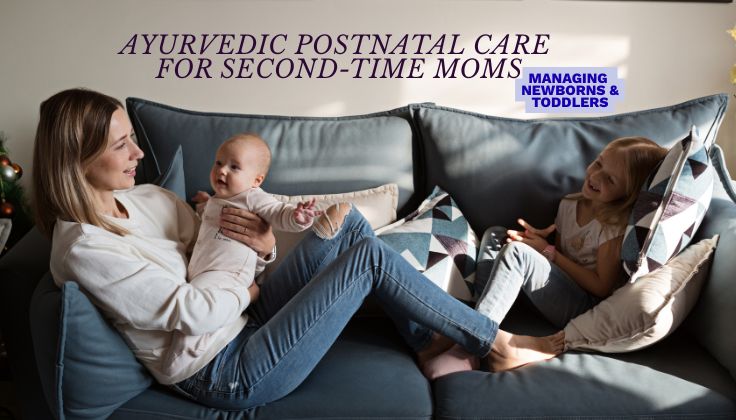


Postnatal Care is often talked about in relation to first-time mothers, but the needs of second-time moms can be just as demanding, if not more. The difference is that now, recovery and bonding with the newborn are only one part of the journey. There is also a toddler at home who requires attention, structure, and reassurance. Ayurveda, with its long-standing wisdom on balance and healing, gives practical guidance for this stage. It does not replace modern medical support, but it provides a framework for rest, nourishment, and emotional steadiness that many mothers find valuable.
This blog looks at how Ayurvedic postnatal care can support experienced mothers, focusing on managing the newborn alongside the toddler, and helping mothers regain strength in a balanced way.
Some mothers assume that because they have gone through childbirth once, the recovery will be easier the second time. The reality is that each delivery affects the body differently. Muscles, joints, and reproductive tissues may take longer to recover. Sleep deprivation can be more intense, especially when nights with the newborn are paired with early mornings with the toddler.
Ayurveda views this stage as a vulnerable window, where the body’s natural balance can be disturbed if not cared for properly. The goal is to support the mother so that she regains stability, both physically, mentally, and emotionally. That way, she has the resilience to look after both children without neglecting her own needs.
In simple words, Ayurveda sees childbirth as a process that weakens the body’s natural reserves, especially digestive fire (Agni) and physical strength (Ojas). Postnatal recovery is about restoring these reserves. This includes specific foods, therapies, and routines that bring back warmth, energy, and emotional calm.
The challenge for second-time mothers is not just recovery. It is managing two different stages of childhood at once. Ayurveda does not give a generic rule, but it suggests practical ways to balance.
The newborn requires frequent feeding, warmth, and close physical contact. Ayurvedic oils, such as sesame or coconut (depending on body constitution and climate), are often used for baby massages. This supports the baby’s digestion, circulation, and sleep quality.
Toddlers, on the other hand, may feel uncertain with the arrival of the sibling. Their routines may shift, and they may seek more attention. Ayurveda recommends maintaining familiar routines like regular mealtimes, play, and bedtime rituals, to provide them with stability. Giving simple, wholesome foods at the right times prevents digestive upsets, which are common in toddlers when their routines are disturbed.
Food is a central element in Ayurvedic postnatal care. The idea is not strict dieting but giving the body what it can digest and absorb easily.
Warm, Cooked Foods: Steamed vegetables, rice, lentils, and porridges.
Digestive Spices: Cumin, fennel, and ginger to prevent gas and bloating.
Healthy Fats: Ghee and sesame oil for strength and lubrication of tissues.
Hydration: Warm water or herbal teas instead of cold drinks.
The thing is, the body needs energy that lasts, not just quick sugar fixes. When meals are steady and nourishing, the mother has the stamina to care for both children without constant fatigue.
Therapies such as Abhyanga (oil massage) and Swedana (gentle steam therapy) are traditionally recommended after childbirth. For mothers, these therapies relieve muscle stiffness, improve circulation, and promote better sleep. When practiced under the guidance of a trained practitioner, they also support hormonal balance and emotional calm.
For second-time mothers, regular therapies can make a noticeable difference. Even if time is limited, scheduling a weekly session provides physical relief and a mental reset.
Caring for a newborn while managing a toddler can be a bit tough. Ayurveda emphasizes that emotional well-being is part of health. Simple practices like sitting quietly with the newborn, storytelling with the toddler, or a short breathing exercise before bed help in maintaining calmness.
Mothers are also encouraged to accept help from family members or trusted caregivers. Ayurveda is clear that a mother should not try to do everything alone. Sharing responsibilities creates space for rest and recovery.
Create a meal plan with easy-to-digest dishes prepared in advance.
Keep both children’s routines predictable, even if flexible at times.
Use oil massages for both mother and newborn to promote bonding and calmness.
Dedicate at least 20 minutes daily to the mother’s relaxation, whether it is deep breathing, gentle yoga, or a quiet walk.
Use natural sleep cues, like dim lights and calming scents, to help both children settle at night.
Ayurvedic postnatal practices are not about rejecting modern medicine. Instead, they complement it. Mothers should continue with medical check-ups, vaccinations, and any prescribed treatments, while also using Ayurveda for day-to-day support and recovery. The integration of both systems offers a well-rounded approach that addresses immediate health needs and long-term wellness.
When recapitulating, for second-time mothers, postnatal care is not just about physical recovery. It is about finding a balance between caring for a newborn and maintaining a connection with a toddler. Ayurveda provides a practical framework for this stage, focusing on diet, therapies, rest, and emotional steadiness. When applied with consistency, it helps mothers regain strength while creating a nurturing environment for both children.
For those seeking guidance, visiting a trusted Ayurveda clinic Dubai can provide access to professional care and customized therapies like Ayurheritage. We focus on supporting mothers with authentic Ayurvedic treatments that align with modern health needs.